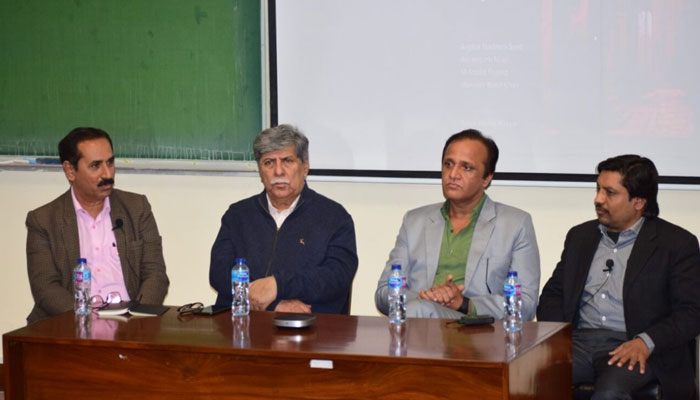Urdu fiction discussed
LAHORE: The Gurmani Centre for Languages and Literature at LUMS recently organised a thought-provoking session titled ‘Why Is Popular Urdu Fiction Reproved?’
According to a press release, this panel discussion brought together leading practitioners, senior academics, and experienced critics on one platform to analyse and assess some of the reasons behind consistent criticism directed at popular Urdu fiction from various quarters.
Dr Nasir Abbas Nayyar moderated the session, and the discussants included Asghar Nadeem Syed, Dr Khalid Fayyaz, and Dr Aurangzeb Niazi. Dr Nasir divided the discussion into two segments. The first segment aimed at understanding the what popular fiction is, while the second segment critically analysed the reasons behind the lack of acclaim from literary critics.
Dr Khalid Fayyaz shed light on the perceived unjust role of popular fiction, highlighting instances where it manipulates readers' minds and indirectly discourages constructive criticism and practical efforts against oppressive regimes. He emphasised the need for a nuanced examination of the genre's impact on various segments of society. Dr Aurangzeb Niazi provided historical context, explaining the evolution of popular fiction and its symbiotic relationship with capitalism and industrialisation. He explained the establishment of the publishing industry and its role in the widespread dissemination of popular fiction, exploring its ties to the consumer economy. Asghar Nadeem Syed discussed the adaptation of popular fiction into drama and film, emphasising its role in the genre's popularity. He underscored the conditionality of its reader community, revealing deeper connections between sociopolitical circumstances and the freedom promised by popular fiction.
-
 Ethan Hawke Reflects On Hollywood Success As Fifth Oscar Nomination Arrives
Ethan Hawke Reflects On Hollywood Success As Fifth Oscar Nomination Arrives -
 Tom Cruise Feeling Down In The Dumps Post A Series Of Failed Romances: Report
Tom Cruise Feeling Down In The Dumps Post A Series Of Failed Romances: Report -
 'The Pitt' Producer Reveals Why He Was Nervous For The New Ep Of Season Two
'The Pitt' Producer Reveals Why He Was Nervous For The New Ep Of Season Two -
 Maggie Gyllenhaal Gets Honest About Being Jealous Of Jake Gyllenhaal
Maggie Gyllenhaal Gets Honest About Being Jealous Of Jake Gyllenhaal -
 'Bridgerton' Star Luke Thompson Gets Honest About Season Five
'Bridgerton' Star Luke Thompson Gets Honest About Season Five -
 Prince William On Verge Of Breakdown Because Of 'disgraced' Andrew
Prince William On Verge Of Breakdown Because Of 'disgraced' Andrew -
 Tig Notaro Reflects On Oscar Nod For 'Come See Me In The Good Light': 'I Was Sleeping'
Tig Notaro Reflects On Oscar Nod For 'Come See Me In The Good Light': 'I Was Sleeping' -
 Kenyon Sadiq Sets 40-yard Dash Record At NFL Scouting Combine, Eyes First Round
Kenyon Sadiq Sets 40-yard Dash Record At NFL Scouting Combine, Eyes First Round -
 Talk Show Host Drops Hint About Taylor Swift, Travis Kelce Wedding Date
Talk Show Host Drops Hint About Taylor Swift, Travis Kelce Wedding Date -
 Andrew Scandal Brings New Worries For Prince Harry, Meghan Markle
Andrew Scandal Brings New Worries For Prince Harry, Meghan Markle -
 King Charles Imposes New Restrictions On Ex-Prince Andrew In Surprise Move
King Charles Imposes New Restrictions On Ex-Prince Andrew In Surprise Move -
 Chris Hemsworth Reveals How Elsa Pataky Guides His Career Moves
Chris Hemsworth Reveals How Elsa Pataky Guides His Career Moves -
 Was Travis Barker In A Relationship With Kim Kardashian Before Marrying Her Sister?
Was Travis Barker In A Relationship With Kim Kardashian Before Marrying Her Sister? -
 Brad Pitt Feeling Down In The Dumps After Kids' Snubs As Pals Continue To Paint Angelina Jolie A Villain
Brad Pitt Feeling Down In The Dumps After Kids' Snubs As Pals Continue To Paint Angelina Jolie A Villain -
 Ex-PM Speaks Out On Andrew Mountbatten-Windsor In Newspaper Column
Ex-PM Speaks Out On Andrew Mountbatten-Windsor In Newspaper Column -
 Eric Dane Remembered In Glowing Tribute By Trans Activist In 'Grey's Anatomy'
Eric Dane Remembered In Glowing Tribute By Trans Activist In 'Grey's Anatomy'




